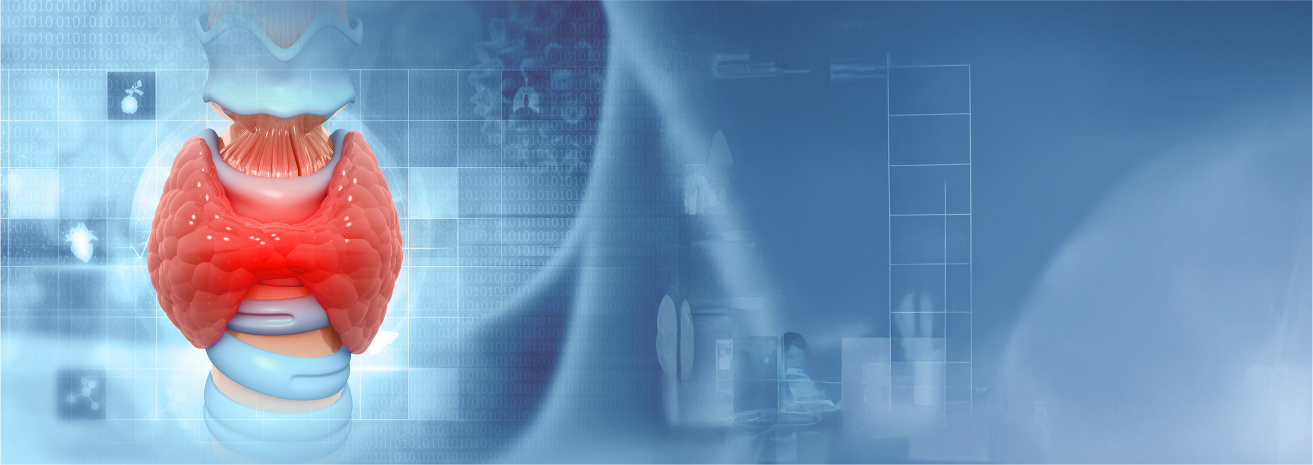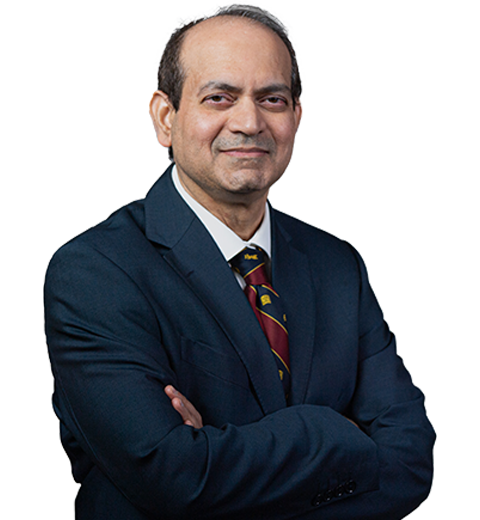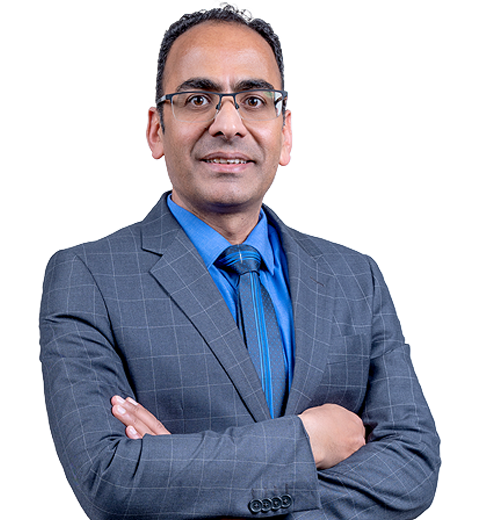Thyroid Cancer

Thyroid cancer arises in the thyroid gland, a butterfly-shaped gland at the base of the neck that produces hormones regulating metabolism. While thyroid cancer is generally treatable and often curable, especially when detected early, some forms can be more aggressive. There are several types, including papillary, follicular, medullary, and anaplastic thyroid cancer. At Burjeel Cancer Institute, we provide personalized care for thyroid cancer patients, offering advanced diagnostic techniques, surgery, radioactive iodine therapy, and targeted treatments.
Common Symptoms of Thyroid Cancer include
- A lump or swelling in the neck
- Hoarseness or voice changes that do not improve
- Difficulty swallowing
- Persistent cough not related to a cold
- Pain in the throat or neck
- Enlarged lymph nodes in the neck.

Risk Factors for thyroid cancer include
Gender and Age
Thyroid cancer is more common in women and typically occurs in individuals under 55.
Family History
A family history of thyroid cancer or inherited genetic syndromes, such as multiple endocrine neoplasia (MEN), increases the risk.
Radiation Exposure:
Previous radiation therapy to the head or neck increases the risk, especially if received in childhood.
Iodine Deficiency
Low levels of iodine in the diet can increase the risk of certain types of thyroid cancer.
Inherited Genetic Mutations
Certain gene mutations, including those in the RET gene, are linked to medullary thyroid cancer.
Diagnostic Procedures
We use a range of advanced diagnostic procedures to detect and stage thyroid cancer accurately, including
Ultrasound
Often used as the first imaging test, ultrasound helps detect nodules in the thyroid gland and assess their characteristics.
Fine Needle Aspiration (FNA) Biopsy
A small sample of tissue is taken from a thyroid nodule using a fine needle for microscopic analysis.
Thyroid Function Tests
Blood tests that measure levels of thyroid hormones and thyroid-stimulating hormone (TSH) to assess thyroid function.
CT Scan and MRI
Advanced imaging techniques used to detect tumors and assess whether cancer has spread beyond the thyroid.
Radioiodine Scan
Used to detect thyroid cancer cells that absorb radioactive iodine, particularly in patients with papillary or follicular thyroid cancer.
PET-CT Scan
A highly sensitive imaging test used to detect metastatic spread, particularly in advanced or recurrent cases.
Genetic Testing
For patients with a family history of medullary thyroid cancer, genetic testing can detect mutations in the RET gene.

Treatment Options
Targeted Therapy and Immunotherapy
- Tyrosine Kinase Inhibitors (TKIs): Drugs such as sorafenib and lenvatinib target specific proteins that thyroid cancer cells need to grow, often used for advanced or metastatic thyroid cancer.
- Immunotherapy: In certain cases of aggressive thyroid cancer, immunotherapy may be used to help the immune system recognize and attack cancer cells.
Chemotherapy and Medical Oncology
- Systemic Chemotherapy: Chemotherapy is rarely used for thyroid cancer but may be recommended in certain aggressive forms, such as anaplastic thyroid cancer.
Radiation Therapy:
- External Beam Radiation Therapy (EBRT): In some cases of advanced or inoperable thyroid cancer, radiation therapy is used to target and destroy cancer cells.
Radioactive Iodine (RAI) Therapy
- RAI Therapy: After surgery, patients with papillary or follicular thyroid cancer may receive radioactive iodine treatment to destroy any remaining thyroid tissue or cancer cells. This therapy targets thyroid cancer cells while sparing other tissues.
Surgical Treatment
- Thyroidectomy: The most common treatment for thyroid cancer, involving the removal of part or all of the thyroid gland.
- Lobectomy: Removal of one lobe of the thyroid, often used for small, localized tumors.
- Neck Dissection: Removal of nearby lymph nodes to check for the spread of cancer, especially in more advanced cases.
- Minimally Invasive Surgery: Laparoscopic or robotic-assisted surgery options are available for certain patients, offering smaller incisions and faster recovery.
Multidisciplinary Approach
Thyroid cancer treatment at Burjeel Cancer Institute is managed by a dedicated team of specialists who work together to develop personalized treatment plans. The team includes
- Endocrine Surgeons
- Medical Oncologists
- Radiation Oncologists
- Nuclear Medicine Specialists
- Endocrinologists
- Radiologists
- Pathologists
- Genetic Counselors
- Oncology Nurses
- Palliative Care Specialists.
This multidisciplinary approach ensures that patients receive the most effective and personalized care at every stage of treatment.


Supportive Care and Patient Services
We offer a variety of supportive care services to help thyroid cancer patients manage their treatment and maintain their quality of life
Nutritional Counseling
Tailored dietary advice to help patients maintain strength and manage side effects during treatment.
Hormone Replacement Therapy
After a thyroidectomy, patients may require lifelong thyroid hormone replacement therapy to regulate metabolism and prevent hypothyroidism.
Palliative Care
Symptom management and quality-of-life support for patients with advanced or metastatic thyroid cancer.
Psychosocial Support
Counseling services for patients and their families to cope with the emotional and psychological challenges of a thyroid cancer diagnosis.
Survivorship Program
Ongoing care and monitoring for patients who have completed treatment, focusing on long-term health and recurrence prevention.
Patient Journey
We guide thyroid cancer patients through every step of their treatment journey, ensuring personalized care and support.
Initial Consultation
A comprehensive evaluation with the thyroid cancer care team, including diagnostic imaging and tests to assess the stage and extent of the disease.
Personalized Treatment Plan
Based on the patient’s diagnosis, preferences, and overall health, a customized treatment plan is developed.
Treatment and Support
Patients undergo the recommended treatments, supported by a multidisciplinary team and personalized supportive care services.
Follow-Up Care
After treatment, patients receive regular follow-ups to monitor recovery, assess treatment response, and manage long-term health concerns.






